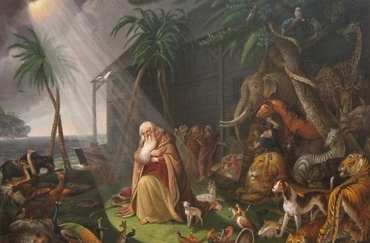1
At nayari ang langit at ang lupa, at ang lahat na natatanaw sa mga iyon.
2
At nang ikapitong araw ay nayari ng Dios ang kaniyang gawang ginawa; at nagpahinga ng ikapitong araw sa madlang gawa niyang ginawa.
3
At binasbasan ng Dios ang ikapitong araw at kaniyang ipinangilin, sapagka't siyang ipinagpahinga ng Dios sa madlang gawang kaniyang nilikha at ginawa.
4
Ito ang pinangyarihan ng langit at ng lupa, nang likhain noong araw, na gawin ng Panginoong Dios ang lupa't langit.
5
At wala pa sa lupang kahoy sa parang, at wala pang anomang pananim na tumutubo sa parang: (sapagka't hindi pa pinauulanan ng Panginoong Dios ang lupa) at wala pang taong magbukid ng lupa,
6
Nguni't may isang ulap na napaitaas buhat sa lupa at dinilig ang buong ibabaw ng lupa.
7
At nilalang ng Panginoong Dios ang tao sa alabok ng lupa, at hiningahan ang kaniyang mga butas ng ilong ng hininga ng buhay; at ang tao ay naging kaluluwang may buhay.
8
At naglagay ang Panginoong Dios ng isang halamanan sa Eden, sa dakong silanganan: at inilagay niya roon ang taong kaniyang nilalang.
9
At pinatubo ng Panginoong Dios sa lupa ang lahat na punong kahoy na nakalulugod sa paningin, at mabubuting kanin; gayon din ang punong kahoy ng buhay sa gitna ng halamanan, at ang punong kahoy ng pagkakilala ng mabuti at masama.
10
At may isang ilog na lumabas sa Eden na dumilig sa halamanan; at mula roo'y nabahagi at nagapat na sanga.
11
Ang pangalan ng una ay Pison: na siyang lumiligid sa buong lupain ng Havilah, na doo'y may ginto;
12
At ang ginto sa lupang yao'y mabuti; mayroon din naman doong bedelio at batong onix.
13
At ang pangalan ng ikalawang ilog ay Gihon; na siyang lumiligid sa buong lupain ng Cush.
14
At ang pangalan ng ikatlong ilog ay Hiddecel, na siyang umaagos sa tapat ng Asiria. At ang ikaapat na ilog ay ang Eufrates.
15
At kinuha ng Panginoong Dios ang lalake at inilagay sa halamanan ng Eden, upang kaniyang alagaan at ingatan.
16
At iniutos ng Panginoong Dios sa lalake, na sinabi, Sa lahat ng punong kahoy sa halamanan ay makakakain ka na may kalayaan:
17
Datapuwa't sa kahoy ng pagkakilala ng mabuti at masama ay huwag kang kakain; sapagka't sa araw na ikaw ay kumain niyaon ay walang pagsalang mamamatay ka.
18
At sinabi ng Panginoong Dios, Hindi mabuti na ang lalake ay magisa; siya'y ilalalang ko ng isang katulong niya.
19
At nilalang ng Panginoong Dios sa lupa ang lahat ng hayop sa parang at ang lahat ng ibon sa himpapawid; at pinagdadala sa lalake upang maalaman kung anong itatawag niya sa mga iyon: at ang bawa't itinawag ng lalake sa bawa't kinapal na may buhay ay yaon ang naging pangalan niyaon.
20
At pinanganlan ng lalake ang lahat ng mga hayop, at ang mga ibon sa himpapawid, at ang bawa't ganid sa parang; datapuwa't sa lalake ay walang nasumpungang maging katulong niya.
21
At hinulugan ng Panginoong Dios ng di kawasang himbing ang lalake, at siya'y natulog: at kinuha ang isa sa kaniyang mga tadyang at pinapaghilom ang laman sa dakong yaon:
22
At ang tadyang na kinuha ng Panginoong Dios sa lalake ay ginawang isang babae, at ito'y dinala niya sa lalake.
23
At sinabi ng lalake, Ito nga'y buto ng aking mga buto at laman ng aking laman: siya'y tatawaging Babae, sapagka't sa Lalake siya kinuha.
24
Kaya't iiwan ng lalake ang kaniyang ama at ang kaniyang ina, at makikipisan sa kaniyang asawa: at sila'y magiging isang laman.
25
At sila'y kapuwa hubad, ang lalake at ang kaniyang asawa, at sila'y hindi nagkakahiyaan.







